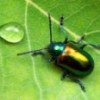This morning I was picking through recent ant literature for a 2008 myrmecological retrospective post when I stumbled on this little gem.
Why do autumn leaves change to such striking colors? Kazuo Yamazaki thinks it's all about the ants:
Therefore, bright autumn leaves may have adaptive significance, attracting myrmecophilous specialist aphids and their attending ants and, thus, reducing herbivory and competition among aphids.
I hereby proclaim Kazuo Yamazaki the first recipient of an award in his own name, the Yamazaki "Going Way Out On A Limb" Award, for creative lateral thinking in proposing scientific hypotheses.

Wow, I didn't think aphids could see that far. And by the time the leaves change colors, and fall off the tree it's to cold for most aphids anyhow. They've already laid eggs and died right?
MrILTA -- Actually, aphids, especially the flying ones of the fall season, have okay vision, and that is just the time of year they are looking for their woody plant host on which the eggs overwinter, then hatch out to feed, in spring.
Myrmecos -- I might have gone for the "Out on a Leaf"" award for this one, even more tenuous, but fascinating, if true.